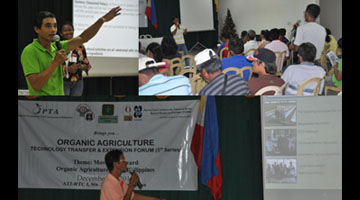 Unlike the usual farmers’ practice in rice production, Ashley Lamaton spreads shredded leafy materials (sunflower or any leguminous plants) on the field and allows them to decompose for 60 days. He also uses shredded compost materials.
Unlike the usual farmers’ practice in rice production, Ashley Lamaton spreads shredded leafy materials (sunflower or any leguminous plants) on the field and allows them to decompose for 60 days. He also uses shredded compost materials.
Lamaton shared this, among other information, at the 5th Forum on Organic Agriculture organized by the Philippine Council for Agriculture, Aquatic and Natural Resources Research and Development (PCAARRD), Organic Producers and Trade Association, and Department of Agriculture-Agricultural Training Institute Regional Training Center.
Incidentally, Lamaton is a Magsasaka Siyentista (MS) of PCAARRD’s Science and Technology-based Farm Project on organic rice production in Chupac, Barlig, Mountain Province.
Another MS, Jaime C. Navarro of Alaminos, Pangasinan, shared that tomato seedlings raised in seedling trays with potting medium composed of garden soil, coco coir, and compost produce healthy seedlings. The transplanted seedlings have less stress, recover fast, and have uniform growth.
Moreover, Navarro uses processed chicken manure in his farm, which improved soil texture favoring root development and better water absorption. He also uses CALPHOS (fermented oyster shells) and other organic inputs like fermented plant juice, fish amino acid, and indigenous microorganisms. These inputs resulted in vigorous, sturdy, and taller tomato plants.
From Pasuquin, Ilocos Norte, MS Onofre G. Balantac talked on his practices in organic garlic production. On the first year of planting, Balantac adopts the “no till” system and spreads rice straw on the field. Instead of applying inorganic fertilizer, he applies dried chicken manure and “Bokashi” before land preparation. To manage insect pests, he uses Trichoderma sp.
Balantac swears that dried chicken manure, composted livestock wastes, and plant residues significantly improve the soil in his farm. Using chemical-free weed control method and botanical pesticides, the production cost for organic garlic production became 52% lower than the farmers’ conventional practice.
Market networking
Aside from technology and information sharing among farmers, extension workers, and researchers, the forum also became a venue for establishing contacts.
“We had a problem with our organic produce in Alaminos, Pangasinan. We did not know where to market them. Now I know where -- and I can encourage other farmers to go on practicing organic farming because there really is a market for our produce”, said Nenita Victo, a farmer-extension worker.
According to Victo, her interest in organic farming waned because of problems in marketing. But things turned around when she attended the forum.
She was encouraged by the presentation of Rogel Marsan on his marketing experiences at the Cosmic Farm, a family-owned farm in Caban, Beckel, La Trinidad.
Marsan’s farm is certified as organic under the group certification of La Trinidad Organic Practitioners Cooperative. The farm produces organically grown fruits and vegetables and with market outlets in Benguet, Baguio City, and Quezon City.
Marsan said that they can buy the organic fertilizers that the group of Victo is producing. They also use rice hulls, which are very abundant in Region 1. Marsan encouraged other farmer-producers in the forum to trade with him their rice hull.
